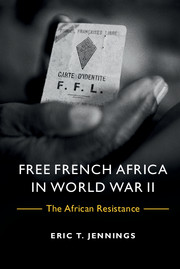Introduction
Published online by Cambridge University Press: 05 August 2015
Summary
In June 1940, France crumbled under the German blitzkrieg. The roughly forty thousand Africans in French uniform during the May–June campaign fought valiantly and died in droves during the brief and tragic Battle of France. German forces infamously committed war crimes against African soldiers who had surrendered, summarily executing approximately 3,000 of them immediately after fighting ceased. Nazi propaganda reels mocked African prisoners and derided the French high command for using black combatants. Captured black troops, hailing predominantly from French West Africa, would spend much of the remainder of the war in prisoner camps, guarded first by Germans, then astonishingly as of 1943, by Vichy French guards.
These events are well established, recounted by historians, some of the stock images shown and re-shown in documentaries starting with The Sorrow and the Pity. What seems less recognized is that only months after France's defeat, another army was raised in French Africa to fight the Nazis. In late August 1940, Charles de Gaulle's Free French seized Cameroon and French Equatorial Africa (FEA), vast territories spanning from south of the equator to the Sahara. They promptly turned them into the first hotbed of French resistance. Free French Africa lent immediate credibility, legitimacy, manpower, and revenue to de Gaulle's movement in its infancy, when it was most fragile. It is the story of this improbable French military and institutional rebirth through Central Africa that I wish to tell here.
“With what rage anti-Gaullists of both the left and the right, the Communists and the Vichyites, relentlessly propagate the myth of a London Resistance. To both sides, I counter with the truth: Free France was African.” So claimed prominent Free Frenchman and ethnologist Jacques Soustelle in his memoirs. Indeed, in the fall of 1940, London offered Free France neither combatants, raw materials, territory, nor sovereignty. Territorially, Free France spanned from the Libyan border with Chad to the Congo River, and to the scattered small French territories of the South Pacific and India. Without the support of these colonial holdings, what credibility, what international recognition, what counterweight to Vichy's legitimacy could a maverick general in London have mustered?
- Type
- Chapter
- Information
- Free French Africa in World War IIThe African Resistance, pp. 1 - 8Publisher: Cambridge University PressPrint publication year: 2015

